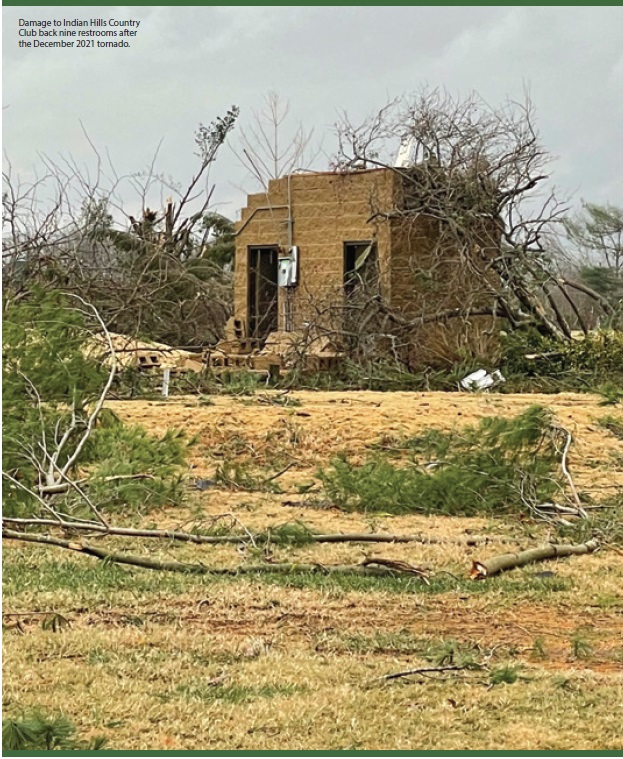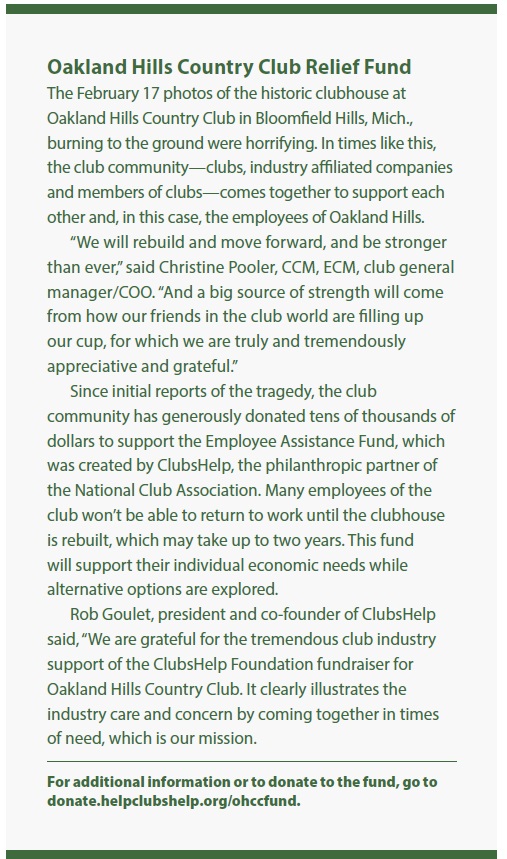Indian Hills in Bowling Green, Ky., is a ClubCorp Network property that dates to 1956, when it opened with nine holes and a “dancing house,” which is what members called the clubhouse. Course architect William Langford added nine more holes to the facility in the 1960s. The course features undulating fairways and good elevation, and has been described as “tough but enjoyable.” Indian Hills has 475 members—it netted 100 new members in 2021—and will cap membership at 500. General Manager Ken Crowder said the club has worked diligently to grow.
When Crowder interviewed for the general manager position, membership still was reeling over a December 2019 fire that destroyed the clubhouse that was finished just a decade earlier, its sturdy wood and indelible memories reduced to piles of charred gray ashes. With a new clubhouse under construction as he interviewed, Crowder met with club members, club staff and board members. He returned home with great admiration for the group’s overall spirit and resiliency. He was offered the job, accepted it, and started as GM on March 1. Within months, he would come to learn a great deal more about his membership.
Tornadoes
In early December 2021, nearly two years to the day of the fire and just a month past the grand opening of a beautiful new $5.5 million clubhouse at Indian Hills, Bowling Green faced disaster again in the form of five historic, deadly tornadoes that ripped through the southern part of Kentucky. The tornadoes hit in the wee hours of a Saturday morning. When daylight appeared, Crowder had to find a back path into the club, past debris that was tossed and strewn everywhere.
What he saw: The club’s back nine had lost more than 200 trees, rendering five previously tree-lined holes all but barren. There was not a patch of green fairway or rough even visible beneath the fallen limbs. Trees had pierced the roof of the cart building. Tornadoes had destroyed a bathroom on the course and ripped through the back side of the maintenance building. Crowder said he held his breath as he approached the new clubhouse, fearing the worst. And there it sat, just 50 yards from havoc, virtually untouched.
“I don’t think a patio chair moved,” Crowder said, still marveling at the sight. “I really don’t know what the right adjective is. Eerie? Amazing? It’s almost like Mother Nature said, ‘You know what? You’ve been through a lot, so I’m going to miss the clubhouse.’”
Crowder was careful to not be insensitive to the overall devastation the Bowling Green community endured, much like smaller Kentucky communities such as Mayfield, which sits a couple of hours drive to the west, tucked in the southernmost corner of the state. These communities face long roads to recovery. Some families lost everything. Crowder knows buildings and structures eventually can be rebuilt and replaced, but human lives lost cannot. Indian Hills, though hit by winds that exceeded 150 mph, was, in the grander picture, spared, certainly in terms of human loss.

He and other Kentuckians continue to do their best to work through a difficult hand, and much work remains. What residents have learned in the wake of a devastating natural catastrophe—the tornadoes’ death toll neared 90 and reduced some areas to appear like scattered matchsticks—is that it truly takes a village to rebound. On one clean-up day at Indian Hills, well-known member Jim Richards, who was men’s basketball and golf coach at nearby Western Kentucky University, told Crowder he might know someone who could help.
Richards dialed a number and handed his phone to Crowder; on the other end of the call was Kentucky resident Kenny Perry, 14-time PGA Tour champion and winner of four PGA Tour Champions majors, including two U.S. Senior Opens. Perry lives in Franklin, Ky., where he operates his own golf club.

Operation BBQ Relief
Through a friend, Perry heard about ClubsHelp, a nonprofit started during the Covid-19 pandemic established to help those in need and relayed that to Crowder. ClubsHelp (clubshelp.org) connected Indian Hills with Operation BBQ Relief, an incredible nonprofit operation started when a deadly EF5 tornado ripped through Joplin, Mo., in 2011. Operation BBQ Relief and ClubsHelp share a common goal: helping people in times of need. Crowder, from the midst of the storm in Bowling Green, was onboard, and generously offered the services of his club.
Operation BBQ Relief quickly got on the ground in Kentucky, setting up cooking operations in Lowe’s store parking lots in Mayfield, which was hit hard, and in Bowling Green. Indian Hills had a food truck it used after the clubhouse burned in 2019 and lent it to Operation BBQ Relief operation. Many of Indian Hills’ members pitched in to aid Operation BBQ Relief’s community volunteer efforts to help deliver food to those in need.
Operation BBQ Relief’s operation in Bowling Green included more than 200 volunteers, 6,200-plus volunteer hours, and served nearly 75,000 hot meals.
“It’s just that one meal that touches your heart,” volunteer Bryan Haupt told Bowling Green television station WFIE in late December. “You don’t realize when you hand a hot meal to somebody what it might mean to them. It’s not necessarily that meal itself, but just that act of giving and kindness. I had a lady last week, we hugged and cried for a good five to 10 minutes. It just touches your heart. That’s why we are here.”
ClubsHelp helps integrate and mobilize its more than 700 member clubs into relief efforts in rapid response to disaster needs across the country. A golf club at the center of a community might have a parking lot large enough for an operation such as Operation BBQ Relief to get set up to cook and help. ClubsHelp applauds the tireless work of Operation BBQ Relief and works to support the organization in any way that it can.
“Operation BBQ Relief is grateful to have teamed up with ClubsHelp to serve communities in Kentucky following the historic tornado,” said Stan Hays, Operation BBQ Relief’s CEO. “The mission of ClubsHelp combined with its dedicated members throughout the country, will continue to be a valuable resource for Operation BBQ Relief as we share this healing power with communities in need.”
Added Crowder, who had not previously known of Operation BBQ Relief and its mission, “That group is one well-oiled machine. They rolled in with this big food trailer, and these huge smokers. They started cooking nonstop, and they had volunteers from around town.
“A bunch of our members went in and took turns working shifts, delivering food to distressed neighborhoods and city blocks, to people who just didn’t have access. Operation BBQ Relief knows what they’re doing because they’ve done it before.”
As Crowder and about a half dozen staffers made their way in jeans and boots to the back nine at Indian Hills to begin clean-up efforts in the days immediately following the tornadoes, it was not uncommon for Crowder to be joined by 30 to 40 of his members. He had 75- and 80-year-old men, 50-year members of the club, out cutting limbs and dragging them to piles and wood chippers.
“It opened my eyes,” said Crowder. “Even though I knew this was a membership passionate about their club and community … to see how they performed during a time of crisis, it not only solidified my initial thought, but took it up a notch. It was impressive to see.
Jeff Babineau handles communications for ClubsHelp. He can be reached at [email protected].


